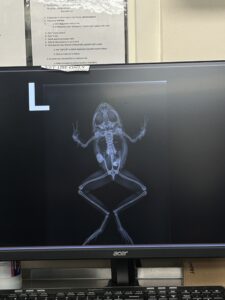Week 7: Discovering the Diverse World of Veterinary Medicine
Jenny T -
Hello everyone! After a hectic last week, things started returning to normal. Well, sort of…
This week at JTED, my class went on a field trip to the Desert Museum! I had never been there before, so it was a fascinating experience. We toured behind the scenes of the medical facility and had the opportunity to talk with Dr. Giles and her technician about zoo and exotic medicine. When I first stepped into the exam room, I was surprised to see Dr. Giles because she’s also a veterinarian at The Hermitage Cat Shelter, where I volunteer every Monday. It was nice to see a familiar face, and I thought it was so cool that she’s involved in multiple fields of veterinary medicine. Dr. Giles explained how having a strong foundation in skills and knowledge with dogs and cats can be applied to other areas of veterinary medicine, with just a few tweaks. We also learned that exotic and avian medicine is expected to see an increase in job opportunities due to the rising demand for the care of these animals. Arthropod, amphibian, and fish care are still in their early stages in veterinary medicine, but the Desert Museum is actively exploring ways to improve their quality of care.

I’m very grateful to have another interview with someone I work closely with. I want to respect the privacy of all my interviewees, so I will give a quick summary of the biggest takeaways:
- Again, clients are one of the most challenging parts to a veterinary professional’s mental health.
- Clients can sometimes be verbally abusive, but it’s important to consider why they’re acting that way.
- Clients experience frustration and stress for their pets, and taking it out on veterinary professionals can be an easy outlet.
- Clients can sometimes be verbally abusive, but it’s important to consider why they’re acting that way.
- At some veterinary facilities, the culture can be toxic among veterinary professionals because everyone is exhausted and burnt out.
- Management is crucial to creating a healthy and safe work environment for everyone to thrive.
- Having coping mechanisms in place can help in stepping back and shifting perspective when faced with a challenging situation.
- Aspiring veterinary professionals should receive early education about the challenges of the field, providing them with the tools and skills needed to succeed.
- Having a strong foundation of mental health resources allows individuals to have something to fall back on and make adjustments that fit their needs.
- It’s better to ask than be wrong when suspecting that someone is having suicidal thoughts.
- Implementing coping mechanisms takes a routine until it becomes automatic.
Lastly, I have updates about my upcoming externship! I plan on working at an urgent care clinic in the next week or two. I chose urgent care because I want to develop my problem-solving skills in a fast-paced environment while gaining more exposure to trauma cases. Based on my surveys and interviews, client interaction is a big challenge in this field of work, so I would like to gain early exposure to challenging client interactions while learning these coping mechanisms and resources.
Thank you for coming by this week! I’ll see you next time!
– Jenny

Comments:
All viewpoints are welcome but profane, threatening, disrespectful, or harassing comments will not be tolerated and are subject to moderation up to, and including, full deletion.